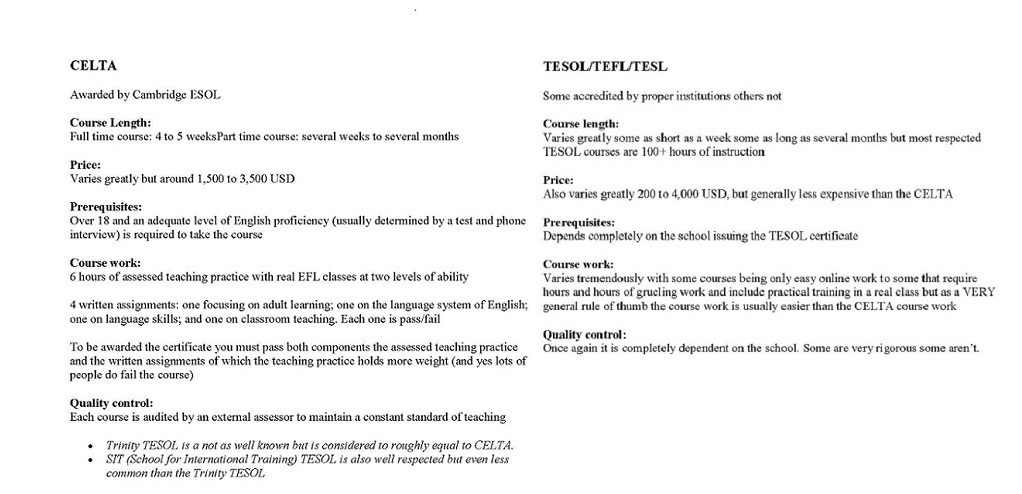For a newbie in the ESL game, there are many daunting decisions that can bite you in the “you know what” later on in your TEFL career. One of them can be the decision of what ESL or TEFL certification to get and where/who you take the course from. I want to tell you that although there are more reputable training courses that are accredited and different types of TEFL courses; The reality of this is that you will find many different opinions in this area.
The different types of courses are simply just acronyms when it all boils down to the heart of it. When looking for a course or training center it will ultimately depend on the location(s) you want to teach, price target, time allowed, and the accreditation or standardized material being used for your certification. Some courses will hold higher respect and are more reputable compared to others but might lack efficiency in other areas that are important to your objectives. Hopefully we can go into more detail on what is important in each TEFL Certification being available in the country you are residing or want to go.
Different TEFL Certifications
When looking online at the different types of certifications to choose from the prospective teacher can get a little overwhelmed. Below we will list a couple and talk a little bit about each of the courses. It is good to know that most of these courses are offered full time online, full-time classroom, or a combination of both.
- TEFL– The TEFL is probably the most widely known and broadest certification out there and accepted by many countries around the world. The acronym stands for “Teaching English as a Foreign Language.” You can find TEFL courses from around 20-60 hours on up to 300+ or a weekend course. The standard for what most schools will look for is at least a 120 hr classroom TEFL with observed in classroom hours at around 20+ for Teaching/feedback. The TEFL is usually the first certification a teacher might attain and then if a teacher decides to pursue his/her career further then maybe they will go for a more intensive course like the CELTA/DELTA.
- TESL– The TESL is another certification with the acronym meaning “Teach English as a second language.” This course is going to be more applicable towards someone that is likely to be teaching ESL in their own Native English Country to second language speakers of English. In the USA there is funding in the Department of Education for ESL and other funding for adults in this area that have chosen to live in a Western Country such as immigrants or foreign exchange students. This certification might be accepted to teach in Asia but might not be the first of choice for the school the teacher wants to work.
- TESOL– The TESOL stands for “Teaching English for Speakers of other Languages”. The TESOL (like the TESL) can be used in the country of native English speakers but is more diverse in the fashion that it can be used like the TEFL in non-native English speaking countries as well. I have found that the TESOL might be used more when someone is in their native country and acquiring a college diploma in teaching English. The TESOL is slowly gaining more speed on the CELTA and in some situations might even be a better certificate in regards to specific methodologies or objectives you are targeting in your ESL career.
- CELTA– The CELTA is an acronym that stands for “Certification in Teaching English Language to Adults“. After speaking to many Teachers and recruiters/Schools alike the CELTA is one of the more reputable Certificates out there to attain and is more trusted because the materials used are more standard across training centers. The good thing about the CELTA is it is geared towards teachers with little to no English teaching experience but can allow you to be a very competitive candidate in the job search. The CELTA is sponsored by Cambridge English exams and is recognized by over 20,000 universities, employers, and governments around the world. Cambridge English has a nice database that you can use to find out which organization might use the different type of Cambridge English Exams. In order to find out more about the syllabus of the CELTA and other assessment guidelines you can download a pdf from the Cambridge English site. After successfully taking the CELTA some experienced teachers may opt to go ahead and take the DELTA which stands for “Diploma in English Language Teaching to Adults“. The DELTA is seen as one of the most prestigious courses in the ESL career pathway and can be a sign of a serious teacher. It takes anywhere from 8-12 weeks as an intensive course and part time can be 6 months to a year.
Breakdown of CELTA vs TEFL/TESOL/TESL
According to the website this Breakdown was taken; their opinion is to go with the CELTA or TESOL for the best opportunities overall in the ESL field. If looking at other considerations such as price, time, or specific methodologies then a TESOL might be the better option. After my time spent in the ESL field, I would have to agree with this author on his opinion of the options and overall decision process. This is not to say a TEFL would not land you a job in the ESL field and most likely would get you the desired job. However as far as standardization and credibility then the latter options seem more valid to me as far as the bang for the buck in your overall $ and time spent.
STANDARDIZATION AND ACCREDITATION
 EDUCATIONAL ACCREDITATION is a type of quality assurance process under which services and operations of educational institutions or programs are evaluated by an external body to determine if applicable standards are met. If standards are met, accredited status is granted by the appropriate agency.
EDUCATIONAL ACCREDITATION is a type of quality assurance process under which services and operations of educational institutions or programs are evaluated by an external body to determine if applicable standards are met. If standards are met, accredited status is granted by the appropriate agency.
STANDARDIZATION is the process of implementing and developing technical standards based on the consensus of different parties that include firms, users, interest groups, and standards organizations. Standardization can help to maximize compatibility, inter-operability, safety, repeat-ability, and/or quality.
Accreditation is a very important detail in making your decision about the course you will ultimately spend your hard earned money and time. If it is indeed a good school, then they will for sure look at where you attained your TEFL and who is the accredited external body. Most respectable accreditation bodies will hold higher standards and will have their materials, teacher instruction techniques/qualifications, and assessments consistent between schools in order to maintain some type of normalcy or credibility with certifications being given.
Example on Standardization and Accreditation:
Now we all know that CELTA is widely known and accredited by Cambridge English with many centers around the world. Lets try to take a look at one example of an online TEFL course and its accredited body and try to understand the specifics. This case is interesting because I would not suggest taking just any online course but this specific one is accredited by what appears to be a respectful accreditation body. It just shows how diverse the market is and what is available nowadays.
Premier TEFL Which Holds an Accreditation by ACDL
After searching online, premier tefl seemed to definitely offer the best bang for your buck for online TEFL course. While it is accredited by ACDL, it offers a lot of solutions for going after an online course. As well as, I think if you are going to do the online route, it is important to use a company that only specializes in online training.The best thing about about Premier TEFL is they offer 4 different courses at very competetive, if not the lowest price in TEFL certification. As well as with the more hours you get you get to specialize in other areas such as Business English, IELTS, teaching TOEIC, and also Young learners. It definitely is a good way to go, with also holding a worldwide accreditation. They offer a 120, 150, 180, and a 240 hour course starting at 180$ and up. They usually are holding a promotion for the 240 hr course.
ACDL – Accreditation Council for Distance Learning
List of other Regulating Bodies:
- SQA: (Scottish Qualifications Authority): works with schools, colleges, universities and training organisations to develop and deliver our qualifications and assessments in Scotland.
- QCA: (Qualifications and Curriculum Authority): maintains and develops the national curriculum and associated assessments, tests and examinations; and accredits and monitors qualifications in colleges and at work in Wales.
- ODLQC (Open and Distance Learning Quality Council): set up by the government in 1968 to monitor and enhance quality in training and education, the ODLQC is the guardian of quality in open and distance learning and is now independent.
- TRINITY: The Trinity Certificate in Teaching English to Speakers of Other Languages (CertTESOL) is a TESOL or TEFL (Teaching English as a Foreign Language) certificate designed for those with little or no experience of teaching English
- SIT: The School for International Training is a nonprofit educational institution and was founded in 1964 as the School for International Training. SIT is accredited by the New England Association of Schools and Colleges, Inc. (NEASC) through its Commission on Institutions of Higher Education.
- CAMBRIDGE ENGLISH: The exams are recognized by over 20,000 universities, employers and governments around the world. Our English language tests can open doors to higher education, improve employment opportunities, and because they are globally recognized, can increase your choices for study or work.
- BAC– The British Accreditation Council was established in 1984 to provide a comprehensive quality assurance scheme for independent further and higher education in the UK. Our accreditation is recogniszed the world over by students, agents and government officials as the clearest mark of educational quality in the private sector.
So I Can do my course Online?
 The running question in the ESL job field is will my ESL certificate be applicable if I do my course online? The short answer is their is no solid answer. It will ultimately depend on the requirements of your school. You can surf the net til you are blue in the face and get many answers. Although in my opinion it is common sense that the student needs as many hours as he can achieve in the classroom that are observed, critiqued, and offer feedback from qualified instructors.
The running question in the ESL job field is will my ESL certificate be applicable if I do my course online? The short answer is their is no solid answer. It will ultimately depend on the requirements of your school. You can surf the net til you are blue in the face and get many answers. Although in my opinion it is common sense that the student needs as many hours as he can achieve in the classroom that are observed, critiqued, and offer feedback from qualified instructors.
There will be schools that require in classroom hours at a minimum of 20 -25 hours and people do get turned down for jobs without that training. However this is particularly a gray area and if someone has already taught a couple of years then maybe they already have the training. I would suggest if you are looking into teaching English for the first time and desire to do it online; then find a reputable school that does some online instruction and will also give you in classroom observation hours. This area is becoming more reputable as many career paths are moving to online instruction. The CELTA is a good example of which provides an online study combined with face to face teaching practice and follows the same syllabus.
Conclusion
 There are many options when deciding on the appropriate TEFL course for your ESL career. Hopefully you have learned in detail of how vague the market can be but also there are certain guidelines that can prepare you to make the best choice for your TEFL Certificate. In my opinion I would not do less than a 120 hour TEFL course with no less than 20-25 hours classroom experience. You will want this teaching experience when you are faced with 40-60 kids running around your classroom speaking another language other than your own. In many circles as detailed above the CELTA is one of the more reputable certificates to attain but this does come at a price as well is an intensive course. It really all comes down to what you want/can achieve and what is accepted in your areas of work. In the end, most Schools or organizations want an enthusiastic and positive Native Speaker in front of their classroom. This will be the most important factor in Asia when applying for school and obviously the more classroom experience and training the better.
There are many options when deciding on the appropriate TEFL course for your ESL career. Hopefully you have learned in detail of how vague the market can be but also there are certain guidelines that can prepare you to make the best choice for your TEFL Certificate. In my opinion I would not do less than a 120 hour TEFL course with no less than 20-25 hours classroom experience. You will want this teaching experience when you are faced with 40-60 kids running around your classroom speaking another language other than your own. In many circles as detailed above the CELTA is one of the more reputable certificates to attain but this does come at a price as well is an intensive course. It really all comes down to what you want/can achieve and what is accepted in your areas of work. In the end, most Schools or organizations want an enthusiastic and positive Native Speaker in front of their classroom. This will be the most important factor in Asia when applying for school and obviously the more classroom experience and training the better.
 Another thing to mention is to be careful as every day there are dodgy ESL training schools springing up with false promises and sometimes even made up accreditation. Whenever in doubt do diligent research and ask around the blogs/review sections about the particular school. Remember that the price you pay should usually be the only cost and ask about any other expenses involved. You should never have to pay for any type of recruitment fees or job seeking advice. Some schools might even make you pay for your certificate. Attaining the appropriate TEFL Certificate should lead you down a journey of making good $ and not spending it.
Another thing to mention is to be careful as every day there are dodgy ESL training schools springing up with false promises and sometimes even made up accreditation. Whenever in doubt do diligent research and ask around the blogs/review sections about the particular school. Remember that the price you pay should usually be the only cost and ask about any other expenses involved. You should never have to pay for any type of recruitment fees or job seeking advice. Some schools might even make you pay for your certificate. Attaining the appropriate TEFL Certificate should lead you down a journey of making good $ and not spending it.

